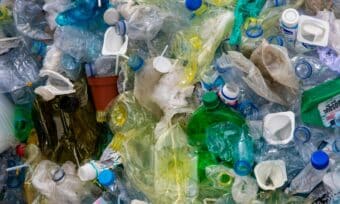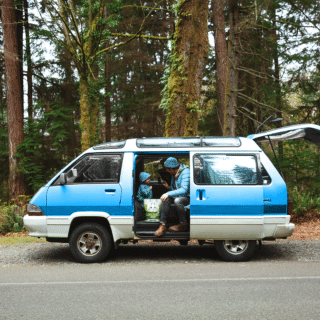Even though we have it in abundance, water is an essential resource. And because it’s so readily available in Quebec, we sometimes forget how important it is to take care of it. The good news? Our water footprint has decreased in recent years. Do you want to be part of this collective effort and learn how to lower your water consumption?
Key takeaways
- Quebec still has one of the highest water consumption rates in Canada, averaging 245 litres per person per day, but the potential for savings is real.
- Simple changes at home such as taking shorter showers, fixing leaks, or using efficient appliances can cut daily water use by up to 30%.
- Residential water-saving systems, such as rainwater harvesting or low-flow devices, are easy for families to implement.
- Cascades supports sustainable consumption, thanks to its manufacturing processes, which consume less water than the North American pulp and paper industry average in 2024*.
Understanding Water Consumption in Quebec: A Collective Issue
Quebec residents have one of the highest levels of residential water consumption in Canada. According to 2023 government reports, the average daily intake reached 245 litres per person, compared to 220 litres across the country**.
This gap is due to several factors: the province’s rich freshwater resources, an aging distribution system that leads to losses, and long-standing consumption habits.
And yet, the potential for water savings is significant. Small efforts at home, such as unplugging appliances on standby, turning off lights, could reduce residential water use by as much as 30%. That kind of reduction would positively impact the entire water treatment cycle, from intake to wastewater processing, which requires energy and infrastructure.
Failing to act now also involves a risk of overusing a healthy resource and putting pressure on the environment and public systems. Learning to calculate how much water your household really uses is a good starting point, as it helps raise awareness and encourages long-term behavioural change.
Reducing our water intake is also an actionable environmental step that helps protect resources for future generations. Whether you live in a house or an apartment, in the city or in the countryside, every litre matters. In general, being mindful of how we consume water today is key to ensuring access to it tomorrow.
What Simple Actions Can Help Save Water?
Lowering the amount of water we use isn’t complicated. Small, easy changes to your daily habits can lead to big savings. Here are six simple things you can start doing today:
1. Turn off the tap when brushing your teeth
Are you wondering how to reduce your daily water intake in the bathroom? A good first step is to avoid letting the tap run unnecessarily, such as when brushing your teeth or washing your hands.
A running faucet can waste up to 12 litres per minute. Turning off the tap while brushing is one of the simplest ways to save tap water over time.
2. Take short showers
When it comes to reducing your daily water consumption, start by choosing a quick shower over a bath. On average, a bath uses about 150 litres of water, while a shower uses 17 to 20 litres per minute.
While showers can be more efficient, it all depends on how long they last and what type of showerhead you use.
To optimize your daily water use, aim for a 5-minute shower, or approximately 85 to 100 litres, instead of a bath. A simple timer or shower hourglass can make it fun and engaging for kids, too.
3. Only run full loads of laundry
Did you know that a single load of laundry consumes more than 100 litres of water? Teach your kids to wait until the laundry basket is full before starting a load. The same principle applies to your dishwasher.
Washing in cold water also helps save energy and water consumption. Many machines now offer eco modes or high-efficiency settings to further reduce your daily water use.
Choosing Energy Star®-certified appliances can also make a difference. These high-efficiency models are designed to use less water and energy with every cycle.
4. Fix leaks quickly
Knowing how to reduce your daily water consumption also means being proactive about your home’s plumbing. Repair leaks promptly and replace worn-out fixtures when needed.
A leaking toilet can waste up to 550 litres per day, or over 200,000 litres per year. Even a small leak can result in a great deal of water being lost, a high daily water intake you may not even notice until it shows up on your bill.
These leaks can also lead to other problems related to water, like mold or property damage.
5. Use water-saving devices
There are many ways to reduce your total water usage at home:
● Install a low-flow showerhead
● Use dual-flush or high-efficiency toilets
● Add a flow restrictor to faucets
● Cover your pool to prevent evaporation when not in use
If you need more guidance, consult your local hardware store or a plumbing specialist. Many water-saving devices are affordable and easy to install.
6. Reuse greywater or collect rainwater
Another simple way to conserve water is to reuse what you already have. Collecting rainwater in a storage tank (also known as a rain barrel) lets you use that plain water for cleaning, watering plants, or even flushing toilets.
In a residential setting, these systems help reduce your dependence on potable water, while also limiting the amount of wastewater sent to treatment facilities. They’re also a great way to ensure that you always have enough water on hand for non-drinking purposes, even during dry spells or water restrictions.
Build Better Habits, One Step at a Time
Now that you know how to improve your daily water consumption with a few easy habits, try implementing them gradually, and involve the whole family!
Turn it into a fun challenge for the kids, or use visuals like stickers and timers to track your progress. Every small action adds up.
In Quebec and throughout Canada, conserving water is a shared responsibility that can lead to lasting change.
How Cascades Fluff & Tuff® Supports Smarter Water Consumption
At Cascades Fluff & Tuff®, every action counts. That’s why Cascades design our products with water efficiency in mind, from the materials we choose to how we manufacture them. Compared to the North American paper industry average, our production process saves the equivalent of 1,690,460 21-foot above-ground swimming pools*.
Many of our products are FSC®-certified, a globally recognized standard for responsible forest management. We use 100%-recycled fibres in the manufacture of our toilet paper and paper towels. Using recycled fibre instead of virgin fibre to manufacture Cascades products enabled us to avoid cutting down 31 560 520 million trees**.
And in terms of design? Our paper towels are compostable in industrial and municipal composting facilities***. Their formulation is made to decompose efficiently under controlled conditions, supporting a more circular, low-waste approach.
By choosing Cascades Fluff & Tuff®, you’re supporting a more sustainable water intake strategy as a conscious consumer without compromising on comfort or quality. Protecting the planet starts with everyday choices, in the bathroom and beyond.
*Based on Cascades Canada ULC’s environmental performance compared to the North American pulp and paper industry average in 2024.
**One tonne of recycled fibre represents approximately 17 mature trees that remain in the forest, according to the US Environmental Protection Agency (EPA, 2017). Calculation based on Cascades Canada ULC’s environmental performance in 2024.
***These products are compostable in industrial and municipal facilities, but are not suitable for home composting. Availability may vary by region. Please check with your local facilities.












